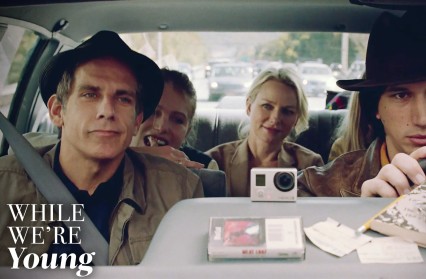Craig Austin reviews Noah Baumbach’s bittersweet film While We’re Young, starring Ben Stiller, Naomi Watts, Amanda Seyfried, and Adam Driver.
Yeah, I’m losing my edge
I’m losing my edge
The kids are coming up from behind
I’m losing my edge
I’m losing my edge to the kids from France and from London
But I was there
LCD Soundsystem – ‘Losing My Edge’
‘Arthritis? You mean arthritis arthritis?’
– Josh, While We’re Young
There’s something wilfully knowing about Noah Baumbach’s decision to ask James Murphy to score his new comedy-drama While We’re Young. The artist’s fragile nursery-chime take on Bowie’s exhortation that ‘nothing’s gonna touch you in these golden years’ acting as the perfect tongue-in-cheek introduction to the film’s melancholy depiction of youth as the definitive lost paradise. As a bittersweet rejoinder to Murphy’s seminal 2002 release ‘Losing my Edge’ – his own take on the post-millennial anxieties attached to the passing of the countercultural baton from generations X to Y – it arrives drenched in the same layers of self-conscious angst that set the tone for the most part of Baumbach’s movie. Yet though the director strives to infuse his comedy with a message that initially seeks to assure the forty-something element of its audience that ‘we’re not laughing at you, we’re laughing with you’ it brings to mind the perplexed response of Helen Jordan in Todd Solondz’s often excruciating black comedy Happiness: ‘…but I’m not laughing’.
Ben Stiller and Naomi Watts portray a jaded New York couple, Josh and Cornelia, temporarily in thrall to the magnetic appeal of two idiosyncratic twenty-something Brooklyn hipsters, Darby (Amanda Seyfried) and Jamie (Adam Girls Driver). As a tale of a disillusioned childless marriage seeking to recapture its youthful vigour via the medium of hipster culture, and ultimately finding it wanting, it succeeds on an impressive number of levels whilst at the same time providing a platform for the timeless and clandestine conflict between successive generations. At times, Baumbach’s snappy dialogue positively crackles. A prolonged deliberation about an indeterminate facet of pop culture results in Jamie’s emblematic Google-spurning challenge to ‘just not know what it is’. Similarly, there is a delicious irony in Adam ‘Ad Rock’ Horovitz – of all people – in the role of Josh’s long-time compadre Fletcher, accusing his newly trilby-sporting peer of being nothing more than ‘an old man in a hat’, and though there are evident echoes of the spirit and confidence of Nora Ephron in Baumbach’s screenplay it is clear that this is subject matter that seeks to pierce as much as it does empathise.
Where While We’re Young truly spears its target however is in its exploration of the notion of authenticity, both human and (counter) cultural. Watts’s killer line is the seemingly ecstatic observation that ‘it’s like their apartment is full of everything we once threw out, but it looks so good the way they have it!’ An insight not entirely reciprocated by the audience at the screening that this writer attended; an all-too audible groan being the principal response to the sight of Jamie eagerly feeding the dusty mouth of his knowingly archive VHS player with yet another lame-o 80’s movie.
Yet let’s not forget that the prevailing cultural zeitgeist makes it seemingly OK to despise hipster-dom, and by association, the arts scene, in a manner so bafflingly vicious that it appears to defy all logic. On one hand it’s a conformist and lazy response to change, a fear of no longer connecting with the notion of what it is to be young; a starched-collar strain of conservatism from people who would no doubt also have mocked both the beatniks of late 50s Greenwich Village and the bondage-clad patrons of McLaren and Westwood’s ‘Sex’. Yet it also unavoidably stems from a deep-rooted sense of suspicion, one not entirely divorced from our austerity-afflicted society; the very real sense that a hugely influential house of cards has been built on nothing more than a foundation of irony, facial hair, and craft beer start-ups; that those with the freedom and luxury of time to create now rely less upon their wits, and more upon their trust funds.
The past remains a dressing-up box to be both plundered and inspired by. Yet where Baumbach slowly drip-feeds Josh and Cornelia the moral and cultural high ground, the latter perhaps best exemplified by a truly sorry-looking Rocky III poster in Jamie and Darby’s consciously ramshackle warehouse apartment, the director is at his most effective in his portrayal of how this contemporary recycling of the past continues to be undertaken so badly. The deification of the obvious bits, the shit bits; because if you want to mine for gold you at least need a little patience, and in a culture that demands immediacy over all else, patience is a commodity whose value has gone through the floor. In this, Driver’s ‘Jamie’ ultimately exemplifies all that is rotten about the worst traits of hipster culture in 2015, an all-too-often ruthless strain of dead-eyed careerism shrouded in the crumpled and threadbare trappings of some notionally alternative philosophy.
Baumbach and his exemplary cast deserve the plaudits that are now beginning to pour in, a response that befits any film that somehow succeeds in conjuring up echoes of both When Harry Met Sally and The Servant. In doing so Baumbach offers up a comedy that straddles both populism and scathing satire, and lives to tell the tale. The director himself having already been compared to the Woody Allen of the 70s and 80s – the master of the comedy of manners.
The manners of While We’re Young undoubtedly maketh Baumbach’s movie. They just happen to be really bad ones.












